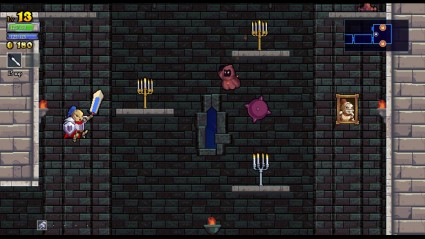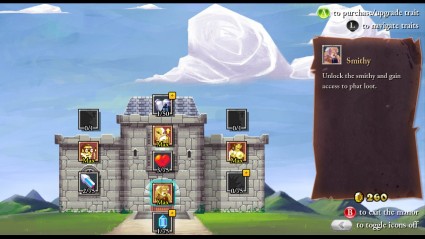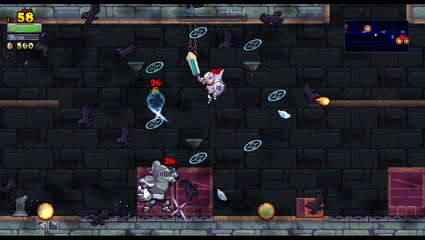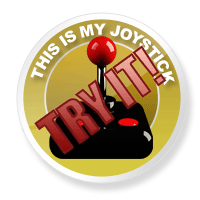Reviews
Rogue Legacy
August 7, 2013, Author: Trent Pyro
It’s funny how the meaning of some words changes over time. Take the word ‘rogue’ for example. Its origin is disputed but it’s generally accepted to come from a ye olde term for a sneaky beggar. Throughout western history it has been used to describe a devious cut-throat or dashing swashbuckler. In more modern times it’s commonly used in role-playing games of all kinds to identify a character that puts dexterity, cunning and guile above physical strength and toughness, and is present in pretty much every RPG ever. At the dawn of video-games, however, rogue meant one very specific thing.
Written to allow college students to play role-playing games on their computers, Rogue became a sensation and inspired a whole genre of its own, dubbed ‘roguelikes’. Known for their incredible difficulty and randomly generated environments, these basic, UNIX-based adventures formed the basis for the modern RPG and are still fondly remembered and played by many.
Attempting to bring the tension and risk of the roguelike to the modern indie market, Cellar Door Games have gifted us Rogue Legacy. A side-scrolling hack ‘n’ slash RPG wrapped around incredible difficulty and a few neat ideas, I took a punt on this nice-looking title on Steam. Considering the last game I played by Cellar Door was a flash game about trying not to shit yourself (no joke), I couldn’t miss the chance to see what these guys could do. Question is, was it worth my 12 quid?
Family values
There isn’t much of a story to Rogue Legacy and that’s not exactly to its detriment. There’s a castle and some evilness is going on inside it. There’s something to do with a prodigal prince and a king who you mercilessly cut down at the start of the game, all told through the prince’s journals hidden about the castle.
Having any kind of strong narrative would be difficult with the game’s randomly-generated levels. Instead, Rogue Legacy allows you to craft your own epic storyline through its neat generational system.
I’m skipping ahead to gameplay mechanics here. Basically, although the game is obviously designed to be a dedicated romp through multiple lifetimes with a focus on building up stats and equipment over time, there’s not actually much opportunity for building a unique narrative to go along with that. It’s quite funny to look back into your history and fondly remember that mage who reached a boss with 4 HP and managed to survive for more than a second, but the lack of any real chronicle in regards to what each ancestor actually did makes this little more than novelty.
Born to die
Okay, so now I’ll give context to the myriad of gameplay mechanics I was forced to allude to in the last section.
Rogue Legacy works on the principle of repeated and assured failure. Each time you die, your character remains dead, with one of their ancestors taking their place on your next run. Each run is different, with the castle layout being reshuffled every time. Any gold you managed to snaffle before you met your untimely end is retained and can be used to buy a range of equipment and upgrades that are constant to your family. In this regard, it’s similar to any normal RPG; except you have to pretty much start the game over with each new life.

Wahey, I’m a bearded lady-knight!
Despite there being nine classes, each upgradeable to a second form, every character is your traditional knight in shining armour, albeit with slight tweaks for each class. Your basic sword attack defines the term ‘basic’, being a simple downward swing. You can jump as well. It harks back to the age when a controller consisted of two buttons and a D-pad; there’s no combos or special moves here.
Each new ancestor gets a random spell, although these often resemble Castlevania-like powerups rather than typical magic. These spells use mana, which doesn’t really need explaining, and both this and health can be replenished as you go by finding potions and chicken legs respectively.
The classes fall into typical categories. The Knight is your all-round fighter; the Mage gets more MP; the Knave has shit stats but excellent critical hits; and the Barbarian soaks up damage like a sheet of Plenty.
Upgrading them brings new abilities that are more-or-less useful. The Paladin’s shield initially seems like a godsend until you realise each attack it blocks chomps 25MP from the class’s limited pool. The Archmage can switch between a number of spells, which is handy if you know how to use them. The Barbarian King gets a Dragon Shout (I can hear Bethesda filing the lawsuit) that clears the screen of all nasties. The Assassin can turn into a cloud of invincible mist for about three seconds before its mana pool runs dry.
There are a number of unlockable classes too, each with their own second form. The Shinobi is a brutal mêlée fighter, who sacrifices the ability to deal critical hits for a large boost in base damage and speed. The Miner is relatively weak in every way but gets a 30% boost to gold found and can see every icon on the map without having to enter the rooms. The Lich saps HP from every killed enemy, making it an invaluable class for surviving until that elusive end boss. Finally, the Spellthief gains mana with every hit, allowing it to fire off spells much more frequently. The upgraded forms of these classes apparently grant more bonuses and there’s talk of a final Dragon class, but to be perfectly honest, I never got that far.
While this may all seem boringly derivative, it’s the unique elements Cellar Door have included that set Rogue Legacy apart. Each ancestor can have up to two random traits, good or bad. These range from the useful: berserker rage, faster movement; to the infuriating: short-sightedness, an invisible health bar; to the downright ridiculous: IBS, baldness.
The random nature of these traits adds a level of odd realism to proceedings, but can often result in having to choose the lesser of three evils. Many a time I felt like the football captain having to choose between the fat kid, the skinny kid and the kid with lots of allergies, to use a horrifically stereotypical American analogy. Still, at least it shakes things up, and in an age of constantly repeated templates it’s nice to see some humorous originality.

Upgrading a medieval manor is bloody expensive…
What keeps you playing past the first few miserable deaths is the constant upgrade system. You can spend gold to upgrade your manor, unlocking stat upgrades and new features. The Blacksmith sells you equipment if you bring him blueprints; the Enchantress deals in runes that give you special abilities; and the Architect can lock a layout of the castle if you’re happy with being carried out of there with only 60% of your hard-earned gold.
While all these features are neat, often the gold cost outweighs the benefit. This wouldn’t be too much of a problem if constantly upgrading wasn’t so doggedly necessary to successful progression. To top it all off, Charon (the medieval equivalent of that dropout yob who mugs you in the underpass near your flat every time you’re walking home from work) robs any gold you weren’t able to spend every time you re-enter the castle. So often are your spending options limited, you regularly have to hand over hundreds of gold coins to this thieving prick for the privilege of continuing with the game. What a kick in the teeth.
Rogue Legacy kicks the shit out of you right from the off and refuses to stop. Some lives feel like a joke, with the first room rammed full of enemies and projectiles. As you desperately try and weave your short-sighted dwarf Knave through the instant barrage of crap it’s hard to resist the urge to commit suicide and hope for a better set of kids next time.
Enemies are all designed to piss you off, with even the most banal creatures exercising deft manoeuvres, tricky attack patterns and wall-dodging projectile moves. If you stop to think, you’re screwed. While I understand that the game is designed to be a fiendish challenge, I’ve never been a fan of games that take pleasure in setting you up to fail. As it’s almost impossible to perceive the faint reality of every surviving more than five minutes initially, let alone finishing the game, it can take some serious willpower to carry on. As the gameplay is generally basic and the progression can be horribly slow, I can see a lot of players giving up early and feeling more than a little cheated.
Cartoon castle
Striking a balance between Castlevania‘s creepy horror and Castle Crashers‘ cutesy-kids-cartoon look, it’s no exaggeration to say Rogue Legacy shines visually. The ever-changing castle’s four persistent sections each have their own style and palette, lending a distinct visual change to accompany the rise or fall in difficulty. Nothing stutters or glitches either; in all my time with the game I didn’t see so much as a wrinkle.
The enemy types are widely varied and interesting, if a little traditional. There’s clear homage paid to Castlevania, with hulking knights and floaty skulls abound. It’s good to see that the enemies are as distinct as their soul-crushing attacks, though. As you transition between the areas the enemies morph too, leaving behind the medieval look for a more fantasy/horror style. Each one is lovingly animated and dutifully coloured too.

Shit gets real once you leave the lovely confines of the castle
The castle itself sports a fantastic amount of accessories and dressings, with every room filled with books, hearths, lamps and portraits that make the place feel lived in. It’s often these small but crucial environmental touches that time-starved indie devs neglect to include but Cellar Door have clearly recognised how important these elements are to making a place feel right.
My only criticism here is that your own character, while blessed with slight variations in generations and equipment, never really steps away from the classic Ghost ‘n’ Goblins knight archetype. Although you get used to the fact even the Mage is clad in plate armour quickly, you never can shake the feeling that a few different costumes could’ve livened things up a bit. The time it took to implement them would, in my opinion, be far outweighed by the effect they would have. Oh well, there’s always updates!
A dull day at court
Unfortunately, as is often the case, Rogue Legacy‘s auditory offering fails to live up to its visual feast. While the sounds on offer are satisfying enough, there’s nothing here that shines. I can imagine it’s quite difficult to find a way to make the oh-so-familiar sound of a sword being swung or a fireball being cast fresh, so I’m not going to be too critical here.
The music is usually where games with little wiggle-room in the sound FX department shape the aural landscape if their world. While Rogue Legacy does an admirable job of painting pictures of haunted castles, creepy woods and foreboding underworlds, it’s all generally basic. The main theme, played every time you start a new generation, is cute but gets mighty irritating considering the amount of times you’re going to hear it. Imagine if you had to listen to that fucking awful rap-metal bollocks that plays when Trials Evolution boots every single time you bail. It’s that annoying.
Lonely knight
For reasons best explained by Cellar Door themselves, there’s no multiplayer to be had in Rogue Legacy. While I can imagine the evil, torturing buggers that crafted this slab of hard would double the enemies if another player was involved, I can’t help but think the experience would be more palatable if shared with an equally-frustrated friend.
I’ve never quite understood why these crushingly difficult games are so often resolutely single-player. Something that is miserably tough becomes a problem shared when tackled with a buddy in tow and I don’t think simply adding the option would detract from the core experience. Again, there’s always room for a bit of hopefully-free DLC.
A worthy legacy?
As a hark back to the days where every step was a dicey risk that could cost you hours of labour, Rogue Galaxy is a fitting tribute to its text-based ancestors. Not for a long time has a cheeky side-scroller given me so much bloody grief and the sense of achievement in simply getting a little farther or finding one chest is palpable. If you’re looking for another project to keep your bile level up during the probably-agonising wait for Dark Souls 2, Rogue Galaxy is just the tonic.
If’ you’re looking for a fun romp through a colourful castle, look the fuck elsewhere. Rogue Galaxy does not give a damn. It doesn’t care about making you feel the hero or giving you a packaged experience that you can relax and enjoy from start to finish. It’s designed to punish, torture and trial in every aspect and is not for the faint of heart or short of fuse. If the tougher parts of Shank wound you up so tight you eventually exploded and murdered a small animal in cold blood, playing Rogue Galaxy would be dangerous.
However, for a game that should come with a warning that reads ‘Warning! Not for those with a quick temper or who tend to break things when they lose at Call of Duty!’ it’s brilliantly designed and clean as a whistle. While its difficulty and structure prevent it from ever truly being for everyone, those that seek out these feisty challenges will be richly rewarded. Cellar Door Games clearly have a bright future ahead and I for one cannot wait to see what they come up with next.
Platforms: PC | Tagged architect, armour, blacksmith, Cellar Door Games, enchantress, generations, knight, Linux, Mac, magic, PC, perma-death, Retro, Rogue Legacy, roguelike, RPG, runes, Side-Scroller, Steam, sword, upgrades



